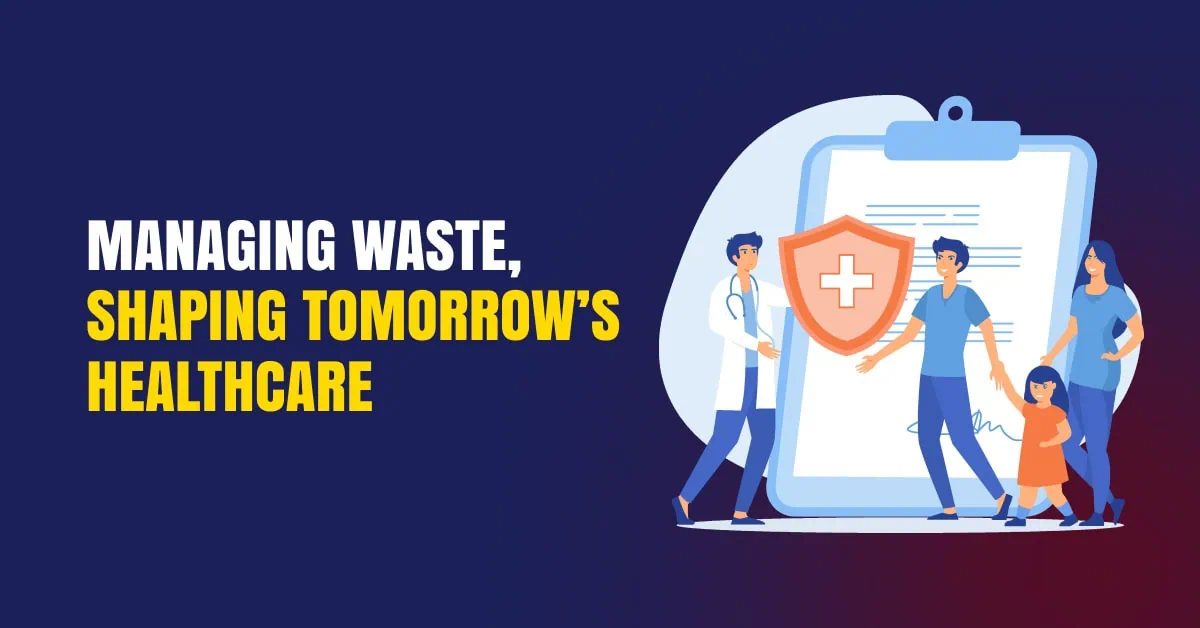Hospital administration is responsible for much more than just staffing, financing, and patient care coordination in the rapidly changing healthcare sector. Hospital waste management is a crucial but frequently overlooked component. The correct treatment and disposal of the tons of biological, chemical, and general waste that hospitals produce daily is crucial for maintaining environmental safety, public health, and regulatory compliance.
The capacity to effectively manage hospital waste is becoming a fundamental managerial skill as healthcare grows more sophisticated and ecologically sensitive. Understanding hospital waste management will benefit aspiring healthcare managers by improving operational effectiveness and reaffirming the hospital’s dedication to safety and sustainability. The significance, procedure, and professional benefits of learning hospital waste management will be covered in this article, along with how educational institutions such as Inspiria Knowledge Campus are including this essential skill into their curriculum.
If you want to master skills like hospital waste management, explore our BBA in Hospital Management course at Inspiria
What is Hospital Waste Management?
Handling hospital waste is a highly specialized process! The methodical processing of trash produced by medical operations, including its separation, collection, storage, transportation, treatment, and disposal, is referred to as hospital waste management. Used syringes, bandages, pharmaceutical residues, pathological waste, and occasionally even radioactive elements are all considered hospital waste.
If this garbage is not managed properly, there may be major health risks, environmental damage, and legal repercussions. 15% of waste produced during healthcare operations is deemed hazardous by the World Health Organization (WHO), and if improperly managed, it may directly endanger patients, employees, and the community.
Our course ensures you graduate with practical skills in waste management, patient care, and hospital operations.
Hospital Waste Management Definition & Scope
Hospital waste management is defined as the systematic handling of medical waste to reduce environmental and human health risks while maintaining operational sustainability and regulatory compliance.
Hospital waste management encompasses the following areas:
- Biomedical waste (infectious, pathological, and sharps waste)
- Pharmaceutical waste, which includes unused or expired medications.
- Chemical waste such as solvents and cleaning products
- Radioactive waste (from departments of nuclear medicine)
- General waste which is comparable to household garbage
Every category has unique traits that require various approaches. Managers must so receive training on these classifications and the procedures for getting rid of them. The scope also covers following regional, national, and worldwide regulations, such as OSHA standards (USA) or the Bio-Medical Waste Management Rules, 2016 (India).
Click Here For Career Scope After BBA in Hospital Management
Why It’s Non-Negotiable for Hospital Managers
The foundation of healthcare operations is hospital management. The repercussions of improperly implemented waste management procedures might be disastrous. The following explains why hospital waste management is an essential skill:
- Safety of Patients and Staff: Poor waste management can result in the spread of illnesses and infections, endangering patients and employees.
- Legal Liability: The healthcare facility may face significant penalties, legal action, or even closure if biological waste regulations are broken.
- Environmental Impact: Poor
disposal causes soil erosion, air pollution, and water body pollution, all of which have an impact on entire communities. - Reputation Management: Patients, partners, and the general public are more likely to trust a hospital that is kept up properly and uses effective waste management techniques.
- Cost Efficiency: By reducing the amount of hazardous waste, segregation and appropriate treatment lower processing costs and penalties.
Learn real hospital management practices with our industry-experienced faculty
Step-by-Step Hospital Waste Management Process
An effective hospital waste management system usually takes the following methodical approach:
1. Segregation at Source
At the moment of generation, waste is sorted using color-coded containers into categories such as infected, non-infectious, sharps, chemical, etc. This is the cornerstone of efficient garbage disposal.
2. Collection & Transportation
After being separated, the garbage is gathered and delivered in containers that are tagged and sealed to prevent exposure or leaks. Transport-related trolleys or carts need to be used specifically for this purpose and kept clean on a regular basis.
3. Storage
Waste is placed in designated temporary storage spaces prior to being treated or disposed of. According to regulations, these spaces need to be labeled, ventilated, and secure.
4. Treatment
Various treatment techniques are employed based on the type of waste:
- Incineration (burning hazardous trash)
- Autoclaving (steam sterilization for infectious waste)
- Disinfection with chemicals (for liquid waste)
- Microwaving (to sterilize some waste materials)
5. Disposal
Waste is transported to approved landfills or recycling facilities following treatment. Reusing some waste can lessen its influence on the environment, such as recyclable metals or plastics.
6. Documentation & Reporting
To guarantee traceability and regulatory compliance, hospitals must keep thorough records of the creation, handling, and disposal of waste.
Role of Hospital Managers in Waste Management
Safe waste measures are strategically enabled by hospital managers. Among their responsibilities are:
- Policy Formulation: Creating and implementing regulations-compliant waste management policies.
- Training & Capacity Building: Ensuring that all hospital employees get emergency response, handling, and segregation training.
- Vendor management: choosing and keeping an eye on outside suppliers for the removal and treatment of trash.
- Auditing & Compliance: To guarantee compliance, conduct routine internal audits and inspections.
- Crisis Management: Handling unintentional spills, exposures, or epidemics brought on by improper waste management.
- Sustainability Planning: Including environmentally beneficial procedures such as waste-to-energy initiatives and recycling.
To create a strong waste management ecosystem, managers need to work with municipal authorities, maintenance departments, and infection control committees.
Find out more about the industry-focused programs offered by Inspiria Knowledge Campus
Career Benefits of Mastering Hospital Waste Management
A plethora of job prospects and benefits arise when you include hospital waste management in your skill set:
1.Greater Employability Scope
Professionals with specific expertise are sought after by hospitals, diagnostic labs, non-governmental organizations, and healthcare consulting corporations.
2. LeadershipTraining
For leadership positions like facility director, operations manager, or hospital administrator, having a solid understanding of waste management shows operational maturity and preparedness.
3. Regulatory Expertise
Managers who are knowledgeable in healthcare waste procedures can help with audits, policy creation, and certifications such as ISO 14001.
4. Global Aspirations
Globally, healthcare facilities deal with comparable waste issues. Working internationally can benefit from your experience, particularly in nations with stringent environmental regulations.
5. Meaningful Contribution
You become part of a larger mission—protecting health and the planet—making your managerial career not just successful, but meaningful.
Holistic Curriculum: Modules on hospital administration, quality assurance, and healthcare operations
How Inspiria Knowledge Campus Prepares You for This Skill?
Inspiria Knowledge Campus focuses on education that extends beyond traditional textbook instruction. Hospital waste management is an important part of the curriculum for those aspiring to work in healthcare management, and students are trained to become professionals who are prepared for the sector.
Key Highlights:
- Holistic Curriculum: Modules on hospital administration, quality assurance, and
healthcare operations all incorporate waste management. - Practical Focus: Through internships, hospital field trips, and mock waste management drills, studentsare exposed to real-world situations.
- Workshops & Lecture Sessions by Visitng Experts: Environmental health officers and industry professionals provide discussions on sustainable practices, developing technology, and
biomedical waste regulations. - Certification Opportunities: It is advised that students obtain further certifications in disaster preparedness, waste management, and hospital accreditation requirements.
- Focus on Sustainability: Inspiria places a strong emphasis on environmentally friendly healthcare procedures, inspiring students to come up with creative solutions that lessen hospitals’ environmental impact.
Inspiria’s approach ensures that graduates not only understand the theory but can also implement effective waste management systems when they step into their roles.
Conclusion:
The management of hospital trash is no longer a backroom affair. For healthcare managers, it is a primary duty that is closely related to sustainability, safety, and compliance. Future managers must be equipped with the knowledge and abilities necessary to meet the demands of the increasingly regulated and environmentally concerned healthcare sector. Gaining expertise in hospital waste management gives future workers a competitive edge and the chance to support safer, more environmentally friendly healthcare systems. The future of healthcare administration appears cleaner, wiser, and more responsible than ever before, thanks to organizations like Inspiria Knowledge Campus that are at the forefront of providing students with this vital knowledge.
Do you want to develop a career in healthcare management that has an impact?
Find out more about the industry-focused programs offered by Inspiria Knowledge Campus.









